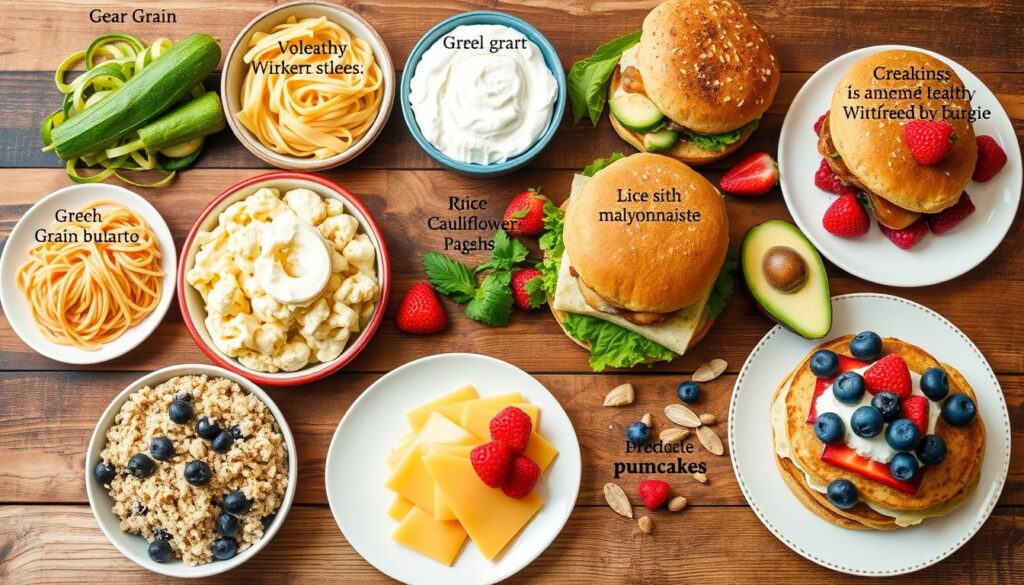Healthy American Dishes prove that you can enjoy American food without compromising on health benefits. In celebration of National Nutrition Month, we dive into the tasty world of balanced eating. We’ll explore seven healthy American dishes that demonstrate how taste and nutrition can come together perfectly on your plate.
Savoring flavor is more than just taste. It’s about enjoying food in a way that feeds both your body and soul. By paying attention to how, when, why, and where we eat, we can change how we view food. This shift not only makes meals more enjoyable but also helps us eat more healthily.
American food is a mix of many flavors and ingredients. From the sea to the heartland, there’s plenty to make Healthy American Dishes. Using fresh, seasonal foods and lean proteins like chicken, we can make dishes that are good for you and taste great.
As we look at theseseven Healthy American Dishes to enjoy flavor while eating well, remember that mindful eating is a journey. It’s about loving each bite, listening to your body, and choosing foods that fit your diet and culture.
Key Takeaways
- Mindful eating enhances flavor appreciation and supports a balanced diet
- American cuisine offers diverse options for healthy, flavorful meals
- Seasonal and local ingredients contribute to more nutritious dishes
- Balanced meals combine lean proteins, whole grains, and fresh produce
- Cooking techniques and smart substitutions can elevate traditional favorites
- Portion control plays a crucial role in maintaining a Healthy American Dishes pattern
- Cultural diversity in American food contributes to a well-rounded diet
Understanding the Art of Mindful American Cuisine
Mindful eating is changing how Americans view Healthy American Dishes. It teaches us to enjoy each bite, noticing the tastes and textures. This way, we not only enjoy our meals more but also get healthier.
The Connection Between Flavor and Nutrition
Mindful eating leads us to pick healthier foods. It helps us see the real flavors of whole foods, making us choose better. A study by Olson and Emery showed that mindful eating can lead to weight loss in many cases.
Cultural Significance of American Dishes
American food shows our rich heritage. From New England clam chowder to Southern barbecue, each dish has a story. Mindful eating helps us value these traditions and their cultural importance.
Principles of Healthy American Dishes
Eating well is essential for health. It means picking a variety of foods for good nutrients. Mindful eating helps us listen to our hunger and make smart food choices.
| Mindful Eating Benefits | Impact |
|---|---|
| Better digestion | Improved nutrient extraction, reduced discomfort |
| Weight management | Natural portion control without strict diets |
| Stress reduction | Promotes relaxation during meals |
| Enhanced enjoyment | Greater appreciation of food flavors and textures |
By adopting mindful eating, we can better appreciate American cuisine and improve our health. This method lets us respect our food traditions while making informed food choices.
The S.A.V.O.R Approach to Healthy American Dishes
Changing how we eat can change our lives. The S.A.V.O.R method gives us a new way to enjoy food. It teaches us to eat slowly, appreciate our meals, and listen to our bodies.
https://www.youtube.com/watch?v=gcIxWIDuKZQ&pp=ygUPI3Bvc2l0aXZlZWF0aW5n
- Slow Down: Take your time to enjoy each bite.
- Appreciate: Savor the flavors and textures of your meal.
- Vary: Explore new foods and cuisines.
- Observe: Pay attention to your body’s hunger and fullness cues.
- Reflect: Consider the nutritional value and joy derived from your meals.
Studies show that mindful eating can cut binge eating by 40%. It also makes us more aware of when we’re hungry or full. Amazingly, 80% of people feel more full after eating mindfully.
| Benefit | Percentage |
|---|---|
| Improved digestion | 60% |
| Decreased stress levels | 30% |
| Higher diet quality | 65% |
By following these tips, we can make every Healthy American Dish balanced and enjoyable. Remember, mindful eating is about making progress, not being perfect. Start your journey to a healthier relationship with food today.
Essential Components of Nutritious American Meals
Making balanced meals is vital for a healthy life. American food offers many choices for healthy dishes. These dishes nourish and taste great. Let’s look at the key parts of nutritious American meals.
Quality Protein Sources
Protein helps build and fix tissues. Choose lean meats, fish, and plants for protein. A good meal has protein for a quarter of your plate.
Grilled chicken, baked salmon, or tofu are good. They help your heart and muscles.
Seasonal Produce Selection
Using seasonal produce boosts nutrition and taste. Non-starchy veggies should be half your plate. They give important vitamins and minerals.
Choose colorful veggies like leafy greens, bell peppers, and carrots. They increase your nutrient intake.
Whole Grain Foundations
Whole grains are key in American meals. They have fiber, B vitamins, and minerals for digestion and energy. Eat one-quarter of your plate with whole grains like quinoa, brown rice, or whole wheat pasta.
| Meal Component | Portion Size | Examples |
|---|---|---|
| Non-starchy Vegetables | 1/2 plate | Broccoli, spinach, bell peppers |
| Lean Proteins | 1/4 plate | Grilled chicken, baked fish, tofu |
| Whole Grains | 1/4 plate | Quinoa, brown rice, whole wheat bread |
By mixing these parts, you make meals that are tasty and nutritious. Choose cooking methods like grilling or steaming. They keep nutrients and flavors better.
Savoring Flavor: 7 Healthy American Dishes for Balanced Eating
Explore a world of taste with these seven healthy American dishes. They bring balance to your plate. These recipes highlight the best of American cuisine while focusing on your health.
Our dishes come from different regions, each with its own flavors. From coastal seafood to heartland comfort foods, they show Healthy American Dishes can be tasty.
- New England Clam Chowder (Lighter Version)
- Southwest Grilled Chicken Salad
- Californian Avocado Toast with Poached Egg
- Midwest Turkey and Quinoa Meatloaf
- Southern-Style Baked Catfish with Collard Greens
- Pacific Northwest Salmon with Roasted Vegetables
- Texas-Inspired Lean Beef and Black Bean Chili
These Healthy American Dishes use lean proteins, whole grains, and fresh produce. They follow Healthy American Dishes principles. For example, lean beef can be part of healthy diets like DASH and Mediterranean without harming cholesterol.
“Mindful eating reduces the chances of overeating by encouraging individuals to eat slowly and savor each bite.”
Enjoying these dishes mindfully lets you appreciate their flavors. This way, you eat more slowly and pay attention to when you’re full. It’s important to eat when you’re a little hungry and stop when you’re comfortably full.
Add these healthy American dishes to your meals for a great mix of nutrition and taste. By savoring each bite, you’ll not only enjoy your food more but also develop a healthier eating habit.
Regional Influences on Modern Health-Conscious Cooking
American cuisine is changing, with a focus on health. From coast to coast, old dishes are getting a nutritious update. They still taste great.
Coastal Cuisine Adaptations
Coastal areas are leaning towards lighter meals. They’re inspired by the Mediterranean, which is good for your heart. Chefs are adding more omega-3 rich fish like salmon, just like in Scandinavian diets.
Midwest Healthy Comfort Foods
The Midwest is making comfort foods healthier. Now, stews have lean proteins and root veggies. This change follows the New Nordic Cuisine, using local, seasonal ingredients. It keeps the dishes warm and nutritious.
Southern Wellness Interpretations
Southern cooking is getting a health boost. Chefs are choosing grilling and baking over deep-frying. They’re also using more fresh, local produce. This keeps Southern cooking’s essence while making it healthier.
Across America, old favorites are getting a health makeover. This shows that you can eat well and still enjoy cultural flavors and comfort.
Smart Ingredient Substitutions for Traditional Favorites
Updating traditional recipes with healthier options doesn’t mean losing flavor. By choosing smart ingredient swaps, you can make your favorite American dishes healthier. Let’s look at some clever changes that boost nutrition without losing taste.

Try using stevia or allulose instead of sugar in your pumpkin pie. This swap can save 774 calories per cup. For apple crisp, top it with Greek yogurt instead of ice cream. This cuts 150 calories and 20 grams of sugar per serving.
To lighten up your cream of mushroom soup, replace heavy cream with soy creamer. This swap reduces fat and calories by about 60%. For a fiber-rich stuffing, use quinoa or cauliflower instead of bread. You’ll get more protein and antioxidants while cutting carbs.
Mashed potatoes can also get a healthy makeover. Use plain low-fat yogurt instead of butter and cream. This adds protein and probiotics to your dish. For a healthier fall drink, try a pumpkin spice latte with just a splash of milk and one pump of syrup.
- Use Greek yogurt as a one-to-one replacement for sour cream
- Substitute olive oil for butter in equal amounts
- Try zucchini noodles instead of regular pasta
- Use mashed bananas to replace oil in baking recipes
These ingredient swaps offer exciting ways to reimagine traditional recipes. By making these small changes, you can create healthier versions of your favorite dishes without losing flavor.
Mindful Cooking Techniques for Enhanced Flavor
Cooking techniques are key to better flavor. Mindful cooking helps make dishes tasty and healthy. Let’s look at some important methods to improve your cooking.
Proper Seasoning Methods
Seasoning is an art that can change a dish. Use salt to enhance flavors, not hide them. Try herbs and spices to add depth without extra calories. Remember, a little seasoning goes a long way.
Temperature Control
Mastering heat is crucial for flavor. High heat caramelizes sugars for rich flavors. Low and slow cooking tenderizes tough cuts. Keep an eye on your pan’s temperature to avoid burning or undercooking.
Cooking Times and Texture
Timing is key in cooking. Overcooking can lose nutrients and flavor. Aim for a balance where veggies are crisp-tender and meats are juicy. Texture greatly affects the eating experience.
| Technique | Benefits | Examples |
|---|---|---|
| Marinating | Tenderizes and infuses flavor | Citrus-herb chicken |
| Roasting | Concentrates flavors | Caramelized root vegetables |
| Sautéing | Quick cooking retains nutrients | Stir-fried greens |
| Braising | Develops rich, complex flavors | Slow-cooked pot roast |
Using these mindful cooking techniques will improve flavors and keep nutrients. With practice and patience, you’ll enjoy healthier, more satisfying meals.
Creating Balanced Meal Plans with American Classics
Using American classics for meal planning is a tasty way to get balanced nutrition. By adding favorite dishes to your menu, you can enjoy tasty flavors and stay healthy. Let’s see how to make a meal plan that celebrates American food.

Begin by picking a mix of American classics that fit different food groups. Choose lean proteins like grilled chicken or fish, whole grains like brown rice or quinoa, and lots of colorful veggies. This mix ensures you get a balanced diet all week.
Weekend prep is crucial for meal planning. Spend a few hours cleaning and storing greens and veggies. They can last up to a week if kept right. Chop tough veggies like carrots, broccoli, and onions ahead for quick meals. Keep avocados, potatoes, and tomatoes whole to stay fresh.
| Dish | Calories | Protein | Storage Time |
|---|---|---|---|
| New England Clam Chowder | 240 | 14g | 3-4 days |
| Texas Chili | 300 | 25g | 4 days (fridge), 2 weeks (freezer) |
| Mac and Cheese (w/ bean pasta) | 280 | 18g | 3-4 days |
Add these classic dishes to your meal plan, balancing them with lighter options. For example, have New England Clam Chowder with a fresh salad for lunch. Or, have a small Mac and Cheese with grilled veggies for dinner. This way, you can enjoy American classics while keeping your diet balanced.
The Role of Portion Control in Flavor Appreciation
Portion control is key to enjoying food and staying healthy. It helps us eat mindfully and understand serving sizes. This way, we can appreciate food more and take care of our health.
Visual Portion Guidelines
The MyPlate method, introduced by the USDA in 2011, is a simple guide for portion control. It divides your plate into food groups. This makes it easy to make balanced meals:
- Half the plate: Fruits and vegetables
- Quarter of the plate: Lean proteins
- Quarter of the plate: Whole grains
- Small serving of dairy on the side
Serving Size Recommendations
Knowing serving sizes is crucial for portion control. Here’s a guide for common foods:
| Food Group | Serving Size | Visual Comparison |
|---|---|---|
| Lean Protein | 3-4 oz | Deck of cards |
| Vegetables | 1 cup raw, 1/2 cup cooked | Baseball |
| Fruits | 1 medium piece | Tennis ball |
| Whole Grains | 1/2 cup cooked | Computer mouse |
| Nuts | 1 oz | Golf ball |
Following these guidelines helps us eat mindfully and enjoy our food more. Smaller portions make flavors and textures more enjoyable. This aligns with mindful eating principles.
Embracing portion control helps with weight management and improves our dining experience. Being mindful of serving sizes lets us fully enjoy our meals. This way, we can maintain a balanced and healthy diet.
Seasonal Considerations for Maximum Nutrition
Eating seasonally is great for our health and connects us to local food. In December, we get lots of nutritious veggies and fruits. Arugula, beets, broccoli, and Brussels sprouts are some of the best foods this time of year.

Broccoli is a winter favorite that’s full of good stuff. It has sulforaphane, which helps fight cancer and heart disease. To get the most out of it, chop raw broccoli and let it sit for 40 minutes before eating or cooking. This boosts its health benefits.
Seasonal spices like cinnamon, ginger, and turmeric add flavor and health benefits to winter dishes. Cinnamon is full of antioxidants, ginger helps with digestion, and turmeric boosts the immune system and joint health.
“Eating seasonally connects us to nature’s rhythm and provides our bodies with the nutrients they need most during each time of year.”
Try making this Holiday Spinach and Pomegranate Salad. It uses 6 cups of fresh spinach, which is full of nutrients in winter. This salad is a perfect mix of taste and nutrition, celebrating the best of seasonal eating.
| Seasonal Produce | Nutritional Benefits | Cooking Tips |
|---|---|---|
| Broccoli | High in sulforaphane, cancer-fighting properties | Chop and let sit for 40 minutes before cooking |
| Spinach | Rich in iron and vitamins | Use in salads or lightly sauté |
| Pomegranate | Packed with antioxidants | Sprinkle seeds over salads or desserts |
By choosing local, seasonal food, we get the best taste and support our health and local farmers. This way of eating matches our diet to nature’s cycles, giving us the most nutritional value from our food.
Tips for Maintaining Healthy American Dishes Habits
Keeping healthy habits can be hard, but it’s essential for your well-being. Let’s explore some easy ways to make Healthy American Dishes a part of your life.
Meal Prep Strategies
Meal prep is a lifesaver for those with busy schedules. It saves time and helps you avoid unhealthy foods. Cook large amounts on weekends and divide them for the week.
This method keeps you on track with affordable, healthy recipes without daily stress.
Shopping Guidelines
Smart grocery shopping is key for Healthy American Dishes. Create a list and stick to it. Choose whole foods like fruits, veggies, lean proteins, and whole grains.
Read labels to avoid hidden sugars and fats. Shopping the store’s perimeter first ensures you get fresh items.
Storage Solutions
Proper food storage keeps your ingredients fresh and cuts down on waste. Use airtight containers for dry goods. Store fruits and veggies in the crisper drawer.
Freeze extra produce for smoothies or soups. Label everything with dates to keep track of freshness.
| Food Type | Storage Method | Shelf Life |
|---|---|---|
| Fresh Vegetables | Crisper Drawer | 1-2 weeks |
| Cooked Meals | Airtight Containers | 3-4 days |
| Dry Goods | Pantry in Sealed Containers | 6-12 months |
By following these tips, you’ll find it easier to keep Healthy American Dishes habits. Remember, small changes lead to big results over time.
Conclusion
Our journey through Healthy American Dishes has shown us that tasty food and mindful eating can go together. By using the S.A.V.O.R approach, we’ve learned to enjoy the variety of flavors across the United States. This approach helps us see how different regions influence our food choices.
Clean eating focuses on whole, unprocessed foods for better health. It encourages us to pick fresher foods and know what we eat. By adding lean proteins, whole grains, and seasonal fruits and veggies, we make meals that are good for us and taste great.
Remember, Healthy American Dishes isn’t about cutting out food. It’s about making smart choices. By using smart substitutions, cooking mindfully, and controlling portions, we can enjoy American food while staying healthy. Let’s keep exploring healthy American dishes, enjoying every bite and taking care of our health.

